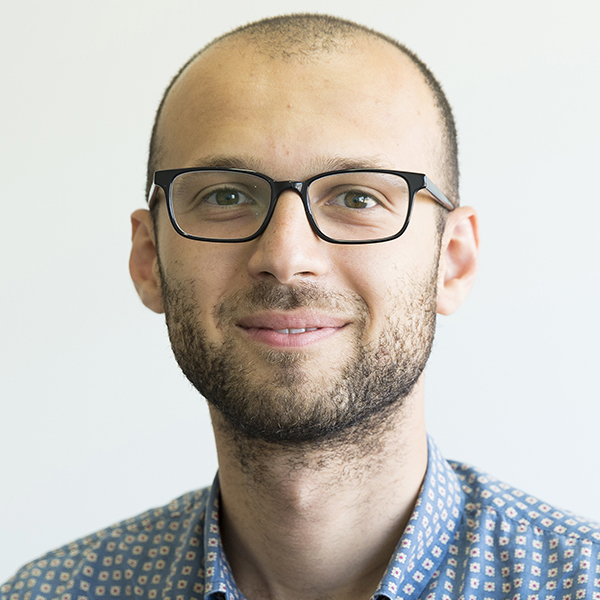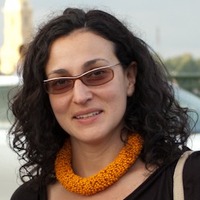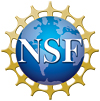| 08:45 – 09:00 |
Message from the FairWare 2018 Chairs (pdf) (slides)
Yuriy Brun (University of Massachusetts Amherst) |
| 09:00 – 09:45 |
-
Keynote: Follow the data! Algorithms and systems for responsible data science (slides)+
Julia Stoyanovich (Drexel University)
Abstract: In this talk, I will give an overview of the Data,
Responsibly project that frames managing data in accordance with
ethical and moral norms, and legal and policy considerations, as a
core system requirement. I will highlight some of our recent
algorithmic advances, and will discuss the over-all framework in
which responsibility properties are managed and enforced through all
stages of the data lifecycle. I will motivate and ground our
technical work in the #NYCAlgorithmicTransparency effort, which was
spurred by a recently passed New York City Algorithmic Transparency
Law.
Bio: Julia Stoyanovich is an Assistant Professor of Computer
Science at Drexel University, and an affiliated faculty member at the
Center for Information Technology Policy (CITP) at Princeton. She
holds M.S. and Ph.D. degrees in Computer Science from Columbia
University. Before joining Drexel in 2012, Julia was a postdoctoral
researcher and an NSF/CRA Computing Innovations Fellow at the
University of Pennsylvania. Julia's research focuses on management
and analysis of preference data, on querying large evolving graphs,
and on responsible data management and analysis practices:
operationalizing fairness, diversity, transparency, and data
protection in all stages of the data acquisition and processing
lifecycle. She established the Data, Responsibly consortium,
co-organized a Dagstuhl seminar by the same name, served on the ACM
task force to revise the Code of ethics and professional conduct, and
is active in the New York City algorithmic transparency effort.
Julia's research has been supported by the US National Science
Foundation, the US-Israel Bi-national Science Foundation (BSF), and
by Google. She is a recipient of an NSF CAREER Award.
|
| 09:50 – 10:10 |
-
A roadmap for ethics-aware software engineering (pdf) (slides)+
Fatma Başak Aydemir and Fabiano Dalpiaz (Utrecht University)
Abstract: Today's software is highly intertwined with our lives,
and it pos- sesses an increasing ability to act and influence us.
Besides the renown example of self-driving cars and their potential
harmfulness, more mundane software such as social networks can
introduce bias, break privacy preferences, lead to digital addiction,
etc. Additionally, the software engineering (SE) process itself is
highly affected by ethical issues, such as diversity and business
ethics. This paper introduces ethics-aware SE, a version of SE in
which the ethical values of the stakeholders (including developers
and users) are captured, analyzed, and reflected in software
specifications and in the SE processes. We propose an analytical
framework that assists stakeholders in analyzing ethical issues in
terms of subject (software artifact or SE process), relevant value
(diversity, privacy, autonomy, ...), and threatened object (user,
developer, ...). We also define a roadmap that illustrates the
necessary steps for the SE research and practice community in order
to fully realize ethics-aware SE.
|
| 10:10 – 10:30 |
-
Classification with probabilistic fairness guarantees +
Philip Thomas and Stephen Giguere (University of Massachusetts Amherst)
Abstract: We design a machine learning algorithm which guarantees
that, with high probability, it will not exhibit unfair behavior.
Importantly, here the users of our algorithm are free to use their
preferred definitions of fairness. This allows our approach to
benefit from and extend existing methods for defining and quantifying
bias in software. To validate our method, we apply it to real data
and show how different notions of fairness can be enforced.
|
| 10:30 – 11:00 |
Break |
| 11:00 – 11:45 |
-
Keynote: Program fairness through the lens of formal methods+
Aws Albarghouthi (University of Wisconsin—Madison)
Abstract: Software has become a powerful arbitrator of a range of
significant decisions with far-reaching societal impact—hiring,
welfare allocation, prison sentencing, policing and, among many
others. With the range and sensitivity of algorithmic decisions
expanding by the day, the problem of understanding the nature of
program discrimination, bias and fairness is a pressing one. In this
talk, I will describe our work on the FairSquare project, in which we
are developing program verification and synthesis tools aimed at
rigorously characterizing and reasoning about fairness of
decision-making programs.
Bio: Aws Albarghouthi is an assistant professor of computer
science at the University of Wisconsin—Madison. He studies software
verification and synthesis, recently with a focus on fairness and
privacy.
|
| 11:50 – 12:10 |
-
Integrating social values into software design patterns (pdf) (slides)+
Waqar Hussain, Davoud Mougouei, and Jon Whittle (Monash University)
Abstract: Software Design Patterns (SDPs) are core solutions to
the recurring problems in software. However, adopting SDPs without
taking into account their value implications may result in breach of
social values and ultimately lead to user dissatisfaction, lack of
adoption, and financial loss. An example is the airline system that
overcharged people who were trying to escape from the Hurricane Irma.
Although not intentional, oversight of social values in the design
of the airline system resulted in significant customer
dissatisfaction and loss of trust. To mitigate such value breaches in
software design we propose taking social values into account in SDPs
explicitly. To achieve this, we outline a collaborative framework
that allows for (i) specifying the value implications of SDPs,
(ii) developing or extending SDPs for integrating social values,
(iii) providing guidance on the value-conscious adoption of design
patterns, (iv) collect- ing and analyzing insights from
collaborators, (v) maintaining an up-to-date library of the valued
design patterns, and (vi) incorporating lessons learned from the
real-world adoption of the valued design patterns into the
proposed framework for its continuous improvement in integrating
social values into software.
|
| 12:10 – 12:30 |
-
Fairness definitions explained (pdf) (slides)+
Sahil Verma (IIT Kanpur India) and Julia Rubin (University of British Columbia)
Abstract: Algorithm fairness has started to attract the attention
of researchers in AI, Software Engineering and Law communities, with
more than twenty different notions of fairness proposed in the last
few years. Yet, there is no clear agreement on which definition to
apply in each situation. Moreover, the detailed differences between
multiple definitions are difficult to grasp. To address this issue,
this paper collects the most prominent definitions of fairness for
the algorithmic classification problem, explains the rationale behind
these definitions, and demonstrates each of them on a single unifying
case-study. Our analysis intuitively explains why the same case can
be considered fair according to some definitions and unfair according
to others.
|
| 12:30 – 13:50 |
Lunch |
| 14:00 – 14:45 |
-
Keynote: Counterfactual reasoning in algorithmic fairness (slides)+
Ricardo Silva (University College London)
Abstract: We propose that intuitive notions of fairness must be
formalized within a causal model: ultimately, we state that
discrimination with respect to a demographic group happens if
belonging to the latter is a cause of the former. In particular, the
counterfactual "had I been from a different group, my outcome would
have been different" is taken as the central motivation. We discuss
how to cast assumptions about the world and society in a causal
language developed in the artificial intelligence and statistics
literature, and how this relates to existing (non-causal) notions of
fairness. Problems of prediction and action are discussed, as well as
how to mitigate the reliance on the strong assumptions necessary for
counterfactual modeling.
Joint work with Matt Kusner, Chris Russell, and Joshua Loftus.
Bio: Ricardo Silva is a Senior Lecturer (Associate Professor) in
the Department of Statistical Science, UCL, a Turing Fellow in the
Alan Turing Institute, and Adjunct Faculty of the Gatsby
Computational Neuroscience Unit, UCL. Prior to this position, Ricardo
got his PhD in the Machine Learning Department, Carnegie Mellon
University, in 2005. He also held postdoctoral positions at the
Gatsby Unit, and at the Statistical Laboratory, University of
Cambridge.
|
| 14:50 – 15:10 |
-
Model-based discrimination analysis: A position paper (pdf) (slides)+
Qusai Ramadan, Amir Shayan Ahmadian, Daniel Strüber, Jan Jürjens, and Steffen Staab (University of Koblenz-Landau)
Abstract: Decision-making software may exhibit biases due to
hidden dependencies between protected characteristics and the data
used as input for making decisions. To uncover such dependencies, we
propose the development of a framework to support discrimination
analysis during the system design phase, based on system models and
available data.
|
| 15:10 – 15:30 |
-
Avoiding the intrinsic unfairness of the trolley problem (pdf)+
Tobias Holstein (Mälardalen University) and Gordana Dodig Crnkovic (Chalmers University of Technology)
As an envisaged future of transportation, self-driving cars are
being discussed from various perspectives, including social,
economical, engineering, computer science, design, and ethical
aspects. On the one hand, self-driving cars present new engineering
problems that are being gradually successfully solved. On the other
hand, social and ethical problems have up to now being presented in
the form of an idealized unsolvable decision-making problem, the
so-called “trolley problem”, which is built on the assumptions that
are neither technically nor ethically justifiable. The intrinsic
unfairness of the trolley problem comes from the assumption that
lives of different people have different values.
In this paper, techno-social arguments are used to show the
infeasibility of the trolley problem when addressing the ethics of
self-driving cars. We argue that different components can contribute
to an "unfair" behaviour and features, which requires ethical
analysis on multiple levels and stages of the development process.
Instead of an idealized and intrinsically unfair thought experiment,
we present real-life techno-social challenges relevant for the domain
of software fairness in the context of self-driving cars.
|
| 15:30 – 16:00 |
Break |
| 16:00 – 17:00 |
Panel: Ansgar Koene (University of Nottingham) (slides), Julia Stoyanovich (Drexel University) (slides), and Yuriy Brun (University of Massachusetts Amherst)
-
IEEE P7003 standard for algorithmic bias considerations (pdf)+
Ansgar Koene (University of Nottingham), Liz Dowthwaite (University of Nottingham), and Suchana Seth (Harvard University)
The IEEE P7003 Standard for Algorithmic Bias Considerations is one
of eleven IEEE ethics related standards currently under development
as part of the IEEE Global Initiative on Ethics of Autonomous and
Intelligent Systems. The purpose of the IEEE P7003 standard is to
provide individuals or organizations creating algorithmic systems
with development framework to avoid unintended, unjustified and
inappropriately differential outcomes for users. In this paper, we
present the scope and structure of the IEEE P7003 draft standard, and
the methodology of the development process.
|
| 17:00 – 17:15 |
Closing remarks |
| 17:30 – 20:00 |
Reception (Congress Foyer): Mingle to the future: Automotive evening
|
You! We welcome attendees who want
to learn about cutting-edge work on software fairness and who want to
be part of the conversation as this important research field gains
momentum. You don't have to be a researcher, and if you are, you don't
have to have worked on this problem before. The primary goal of
FairWare 2018 is to draw attention the important problem of fairness in
software and spark research in this under-explored area. As a result of
the workshop, we will compile a research roadmap paper for the
community interested in advancing fairness. This roadmap will be based
on discussions in the workshop, and will serve as a guide for
researchers to join and advance the community's mission.





